| Listing 1 - 10 of 19 | << page >> |
Sort by
|
Book
Abstract | Keywords | Export | Availability | Bookmark
 Loading...
Loading...Choose an application
- Reference Manager
- EndNote
- RefWorks (Direct export to RefWorks)
Book
Publisher: Odijk Sjaloom
Abstract | Keywords | Export | Availability | Bookmark
 Loading...
Loading...Choose an application
- Reference Manager
- EndNote
- RefWorks (Direct export to RefWorks)
Colonisation. Decolonisation --- dekolonisatie --- Sukarno --- Suharto, Kemusu A. --- Indonesia
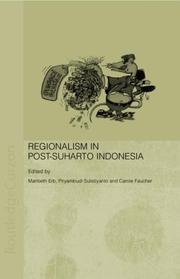
ISBN: 1134263805 1280180420 020369872X 9780203698723 9780415352000 0415352002 9786610180424 6610180423 0415352002 9781134263806 9781134263752 1134263759 9781134263790 1134263791 9780415546027 0415546028 9781280180422 Year: 2005 Publisher: London RoutledgeCurzon
Abstract | Keywords | Export | Availability | Bookmark
 Loading...
Loading...Choose an application
- Reference Manager
- EndNote
- RefWorks (Direct export to RefWorks)
Since the fall of the Suharto regime, forces pressing for regional autonomy have strengthened in Indonesia, with some people arguing that the country is in danger of disintegrating. This book examines a range of issues connected with decentralization and regional autonomy in Indonesia, especially focusing on various local contexts. The multiple issues that are dealt with in this volume include: ethnic revival and violence; corruption, collusion and nepotism; the complexities of administrative reorganization and the forging of new networks; reshaping of cultural identity; new emerging social hi
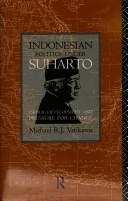
ISBN: 0415082803 9780415082808 Year: 1993 Publisher: Routledge
Abstract | Keywords | Export | Availability | Bookmark
 Loading...
Loading...Choose an application
- Reference Manager
- EndNote
- RefWorks (Direct export to RefWorks)
Soeharto, --- Indonesia --- Politics and government --- Suharto, --- Soeharto, Muhammad, --- Haji Muhammad Soeharto, --- Pak Harto, --- Sūhātō, --- Haji Mohammad Soeharto, --- Soeharto, - 1921-2008 --- Indonesia - Politics and government - 1966-1998
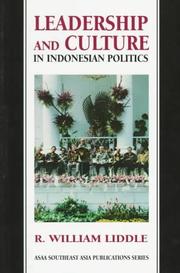
ISBN: 186448196X Year: 1996 Publisher: Allen and Unwin
Abstract | Keywords | Export | Availability | Bookmark
 Loading...
Loading...Choose an application
- Reference Manager
- EndNote
- RefWorks (Direct export to RefWorks)
Political leadership --- Politics and culture --- Culture --- Culture and politics --- Political aspects --- Soeharto, --- Suharto, --- Soeharto, Muhammad, --- Haji Muhammad Soeharto, --- Pak Harto, --- Sūhātō, --- Haji Mohammad Soeharto, --- Indonesia --- Politics and government
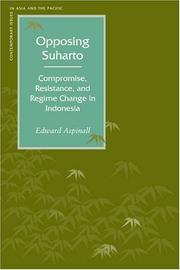
ISBN: 0804767319 1423716566 9781423716563 0804748446 9780804748445 0804748454 9780804748452 Year: 2005 Publisher: Stanford, Calif. Stanford University Press
Abstract | Keywords | Export | Availability | Bookmark
 Loading...
Loading...Choose an application
- Reference Manager
- EndNote
- RefWorks (Direct export to RefWorks)
Opposing Suharto presents an account of democratization in the world's fourth most populous country, Indonesia. It describes how opposition groups challenged the long-time ruler, President Suharto, and his military-based regime, forcing him to resign in 1998. The book's main purpose is to explain how ordinary people can bring about political change in a repressive authoritarian regime. It does this by telling the story of an array of dissident groups, nongovernmental organizations, student activists, and political party workers as they tried to expand democratic space in the last decade of Suharto's rule. This book is an important study not only for readers interested in contemporary Indonesia and political change in Asia, but also for all those interested in democratization processes elsewhere in the world. Unlike most other books on Indonesia, and unlike many books on democratization, it provides an account from the perspective of those who were struggling to bring about change.
Opposition (Political science) --- Political opposition --- Political science --- Divided government --- History --- Soeharto, --- Suharto, --- Soeharto, Muhammad, --- Haji Muhammad Soeharto, --- Pak Harto, --- Sūhātō, --- Haji Mohammad Soeharto, --- Indonesia --- Politics and government
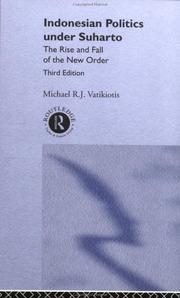
ISBN: 0585460272 0203165330 1134628366 1280325941 9780585460277 9780203165331 9780415205016 0415205018 9780415205023 0415205026 9786610325948 6610325944 9781134628360 9781280325946 9781134628315 9781134628353 1134628358 Year: 1998 Publisher: London New York Routledge
Abstract | Keywords | Export | Availability | Bookmark
 Loading...
Loading...Choose an application
- Reference Manager
- EndNote
- RefWorks (Direct export to RefWorks)
This revised third edition provides an analysis of Suharto's New Order from its inception to the emergence of B.J. Habibie as President. The author reassesses the New Order's origins and its military roots and evaluates the considerable economic changes that have taken place since the 1960's. He examines Suharto's politics and, in a new chapter, the reasons behind the crisis and Suharto's fall.
test --- Soeharto, --- Suharto, --- Soeharto, Muhammad, --- Haji Muhammad Soeharto, --- Pak Harto, --- Sūhātō, --- Haji Mohammad Soeharto, --- Indonesia --- Politics and government --- 830 Economie --- 838 Duurzame Ontwikkeling --- 841 Politiek Bestel --- 841.3 Politieke bewegingen --- 883 Azië --- 883.3 Zuidoost-Azië
Book
ISBN: 9781501735455 1501735454 9781501735462 1501735462 9781501735448 Year: 2019 Publisher: Ithaca, NY
Abstract | Keywords | Export | Availability | Bookmark
 Loading...
Loading...Choose an application
- Reference Manager
- EndNote
- RefWorks (Direct export to RefWorks)
Why are some places successful in moving from war to consolidated peace while others continue to be troubled by violence? And why does post conflict violence take different forms and have different intensities? By developing a new theory of post conflict violence Patrick Barron's When Violence Works makes a significant contribution to our understanding. Barron picks out three post conflict regions in Indonesia in which to analyze what happens once the "official" fighting ends: North Maluku has seen peace consolidated; Maluku still witnesses large episodes of violence; and Aceh experiences continuing occurrences of violence but on a smaller scale than in Maluku. He argues that violence after war has ended revenge killings, sexual violence, gang battles, and violent crime, in addition to overtly political conflict) is not the result of failed elite bargains or weak states, but occurs because the actors involved see it as beneficial and low cost. His findings pertain directly to Indonesia, but the theory will have relevance far beyond as those studying countries such as Colombia, the Philippines, Iraq, Afghanistan, and Syria seek a framework in which to assess what happens after war ends. Barron's theory also provides practical guidance for policymakers and development practitioners. Ultimately, When Violence Works pushes forward our understanding of why post conflict violence occurs and takes the forms it does.
Book
ISBN: 1421415178 9781421415178 9781421415161 142141516X Year: 2015 Publisher: Baltimore
Abstract | Keywords | Export | Availability | Bookmark
 Loading...
Loading...Choose an application
- Reference Manager
- EndNote
- RefWorks (Direct export to RefWorks)
This book will appeal to students and scholars of comparative politics, Asian studies, security studies, and international relations, as well as defense policymakers.
Buddhist monks --- Authoritarianism --- Protest movements --- Buddhist monasticism and religious orders --- Political science --- Authority --- Social movements --- Political activity --- Soeharto, --- Burma --- China --- Indonesia --- Philippines --- Asia --- Asian and Pacific Council countries --- Eastern Hemisphere --- Eurasia --- Politics and government --- History --- Armed Forces --- Suharto, --- Soeharto, Muhammad, --- Haji Muhammad Soeharto, --- Pak Harto, --- Sūhātō, --- Haji Mohammad Soeharto,
Book
ISBN: 1501735454 1501735462 1501735446 Year: 2019 Publisher: Ithaca, New York ; London : Cornell University Press,
Abstract | Keywords | Export | Availability | Bookmark
 Loading...
Loading...Choose an application
- Reference Manager
- EndNote
- RefWorks (Direct export to RefWorks)
Why are some places successful in moving from war to consolidated peace while others continue to be troubled by violence? And why does post conflict violence take different forms and have different intensities? By developing a new theory of post conflict violence Patrick Barron's When Violence Works makes a significant contribution to our understanding. Barron picks out three post conflict regions in Indonesia in which to analyze what happens once the "official" fighting ends: North Maluku has seen peace consolidated; Maluku still witnesses large episodes of violence; and Aceh experiences continuing occurrences of violence but on a smaller scale than in Maluku. He argues that violence after war has ended revenge killings, sexual violence, gang battles, and violent crime, in addition to overtly political conflict) is not the result of failed elite bargains or weak states, but occurs because the actors involved see it as beneficial and low cost. His findings pertain directly to Indonesia, but the theory will have relevance far beyond as those studying countries such as Colombia, the Philippines, Iraq, Afghanistan, and Syria seek a framework in which to assess what happens after war ends. Barron's theory also provides practical guidance for policymakers and development practitioners. Ultimately, When Violence Works pushes forward our understanding of why post conflict violence occurs and takes the forms it does.
Ethnic conflict --- Conflict management --- Peace-building --- Violence --- Violent behavior --- Social psychology --- Building peace --- Peacebuilding --- Peace --- Peacekeeping forces --- Conflict control --- Conflict resolution --- Dispute settlement --- Management of conflict --- Managing conflict --- Management --- Negotiation --- Problem solving --- Social conflict --- Crisis management --- Southeast Asia, postconflict, post-conflict, civil war, Indonesia, violence, conflict studies, peace, President Suharto, postconflict violence, violence in Indonesia, Colombia, Philippines, Syria, Afghanistan, Iraq, Maluku, Aceh, National Violence Monitoring System.
| Listing 1 - 10 of 19 | << page >> |
Sort by
|

 Search
Search Feedback
Feedback About UniCat
About UniCat  Help
Help News
News